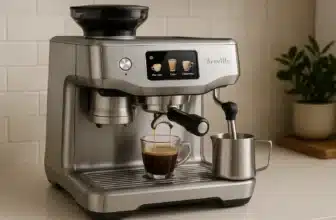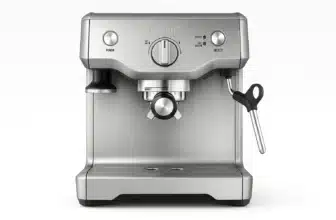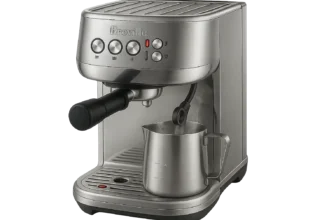
One Hundred Coffee is reader-supported, and some products displayed may earn us an affiliate commission. Details
How Long Does a Coffee Maker Last?
If you’re like most people, your coffee maker is more than just a kitchen appliance — it’s a trusted companion in your daily routine. It greets you bleary-eyed in the morning, fuels your mid-day work hustle, and maybe even helps you wind down in the evening with a decaf cup. But have you ever stopped to wonder: How long will this loyal machine last?
Compact & Reliable
Great for daily use with anti-drip function, auto shut-off, and a keep-warm plate for busy households.
Commercial Quality
Fast brewing and thermal carafe designed for durability and consistent coffee flavor in larger households.
Fresh Brew Timer
Includes freshness timer, delay brew, and a reusable filter for eco-conscious and tech-savvy coffee lovers.In this human-friendly, personal-toned deep dive, we’ll explore everything you need to know about the average lifespan of a coffee maker. From what affects durability to signs it’s time for a new one, and how to make yours last longer — we’ve got you covered.
The Short Answer: 5 to 10 Years (But It Varies)
On average, a standard drip coffee maker lasts 5 to 10 years. Some high-end espresso machines and manual brewers can last even longer. But this is just a general ballpark — the actual lifespan depends on a lot of different factors.
Let’s take a closer look at what goes into that number.
What Influences the Lifespan of Your Coffee Maker?
1. Build Quality
This one is huge. A $30 plastic coffee maker from the supermarket probably won’t last as long as a $300 stainless steel espresso machine with brass fittings.
- Budget models: Often use cheaper materials and lower-quality internal components.
- Premium models: Designed with longevity in mind, often user-serviceable.
2. Type of Coffee Maker
Different types of coffee makers have different lifespans:
- Drip coffee makers: Typically last 5–8 years.
- Single-serve pod machines (like Keurig): Around 3–5 years, depending on usage.
- Espresso machines: 7–10+ years with proper maintenance.
- French press / pour-over: Practically indefinite if you take care of them (they don’t have mechanical parts).
- Grind-and-brew machines: 6–8 years, but more things can go wrong due to complexity.
3. Frequency of Use
Do you brew one pot a day or five? High usage can shorten the lifespan of your coffee maker, especially cheaper models.
- Light use (1 cup/day): Your machine will probably outlive its warranty.
- Heavy use (multiple pots/day): Expect to replace it sooner, unless it’s a heavy-duty machine.
4. Water Quality
Mineral-heavy water (hard water) can cause scale buildup in the machine, which affects performance and longevity.
- Filtered or soft water: Extends the life of internal parts.
- Hard water: Leads to frequent descaling needs, which most people forget to do.
5. Maintenance Habits
Just like with cars, regular maintenance is key.
- Clean your machine weekly.
- Descalve it every 1–2 months (especially if you have hard water).
- Always empty the carafe and reservoir after use.
Your coffee maker will love you for it!
Signs Your Coffee Maker Is on Its Last Legs
No one likes to say goodbye, especially when you’ve bonded over thousands of cups of joe. But all machines wear out eventually. Here are a few warning signs:
1. Slower Brewing Time
If your coffee maker starts taking forever to brew a pot, it might be clogged with mineral deposits or just struggling to function.
2. Weird Noises or Smells
If it starts making loud sputtering sounds, or your coffee smells burnt or plasticky, something’s off.
3. Inconsistent Temperature
Water that’s not hot enough can ruin your brew and might mean the heating element is dying.
4. Leaks
Drips from places that shouldn’t drip? Time to investigate. It could be a seal issue or something more serious.
5. Your Coffee Just Tastes… Off
If you’ve ruled out stale beans or bad water and your coffee still tastes weird, your machine could be deteriorating inside.
How to Extend the Life of Your Coffee Maker
1. Use Filtered Water
This might be the single best thing you can do. It prevents scale buildup, improves taste, and keeps your internal components cleaner.
2. Descale Regularly
Most machines should be descaled every 1–2 months. If your machine doesn’t have a descale alert, set a reminder.
3. Clean Removable Parts Weekly
That includes the carafe, filter basket, and water reservoir. Soap and warm water go a long way.
4. Turn It Off When Not in Use
Leaving your machine on all day can wear down heating elements and electronics.
5. Store It Properly
If you don’t use your coffee maker every day, store it in a clean, dry place. Keep it unplugged and empty.
What Makes Some Coffee Makers Last Longer Than Others?
1. Brand Reputation
Some brands are simply known for durability. Think Technivorm, Breville, Bonavita, and Moccamaster. They build machines designed to last.
2. User-Replaceable Parts
Machines that allow you to replace the filter basket, carafe, or even internal gaskets will last much longer than sealed units.
3. Manual vs. Automatic
Less tech = fewer things to break. Manual brewers like Chemex, French press, or AeroPress can last a lifetime.
4. Warranty and Support
A good warranty (2–5 years) often indicates the manufacturer has faith in their product’s longevity.
When Should You Replace Your Coffee Maker?
You don’t have to wait for it to die completely. Here are times it makes sense to upgrade:
- You want better-tasting coffee: Newer machines often brew at more precise temps.
- You need more convenience: Timers, auto-off, or a bigger carafe can make mornings easier.
- Your machine is out of warranty and acting up: Repairs could cost more than replacing it.
- You’re switching brew methods: Want to go from drip to espresso? That’s a lifestyle upgrade.
Real-Life Example: My Journey With Three Coffee Makers
Let me tell you a little story. My first coffee maker was a basic Mr. Coffee drip model. It lasted me about 3 years before the carafe cracked and the heating plate stopped working.
My second was a Keurig — convenient, yes, but it only lasted about 2.5 years before it started leaking and tasting plasticky, no matter how much I cleaned it.
Now I’m on a Breville Precision Brewer. It’s been with me for almost 5 years, and it’s still going strong. Why? I use filtered water, clean it weekly, and descale it every other month. The difference in durability is crystal clear.
FAQs: Coffee Maker Longevity Questions You Might Have
1. Can I repair my coffee maker?
Sometimes. Higher-end models may have replaceable parts. Check your warranty and user manual.
2. Does descaling help?
Absolutely. It’s one of the most important things you can do to maintain performance.
3. Is a more expensive coffee maker worth it?
Generally, yes. You get better build quality, features, and a longer lifespan.
4. Should I unplug my coffee maker when not in use?
If it doesn’t have a clock or auto-start feature you rely on, yes. It’ll save power and reduce wear.
5. Are smart coffee makers more prone to breaking?
Not always, but more features mean more components that can fail. It’s a trade-off.
Final Thoughts: Brewing with Longevity in Mind
Your coffee maker is your morning hero. And like any hero, it needs a little care to keep saving the day. Whether you’ve got a basic brewer or a high-end machine, its lifespan is in your hands.
With just a little maintenance and some thoughtful usage, most coffee makers will serve you faithfully for years. And when the time comes to part ways, you’ll know it gave you thousands of good mornings.
Most coffee makers last 5–10 years, depending on usage, care, and quality. Treat yours well, and it just might outlast your favorite mug.
So go ahead — brew smart, clean often, and enjoy every cup like it might be your machine’s best work yet.








